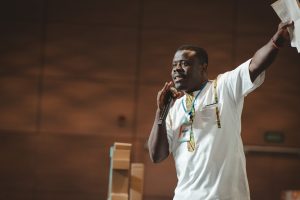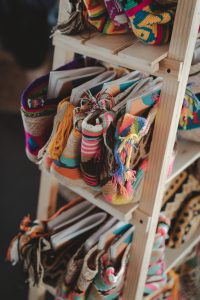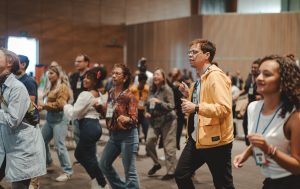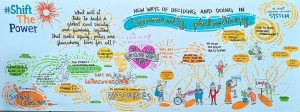Reclaiming the lost power of alternatives, diversity, and solidarity
25 Jan 2024
This blog originally appeared on the Nguzo Africa website.
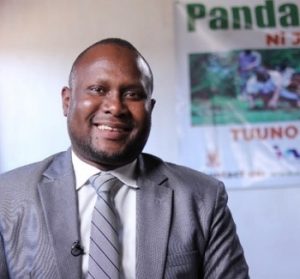
By: Elizaphan Ogechi, Executive Director, Nguzo Africa Community Foundation & a #ShiftThePower Fellow
As you settle after the 2023 #ShiftThePower Global Summit experience with 700 plus change-makers in Bogotá, Colombia, the aside “Summit Communique” is here. It is dedicated to you who felt restless and vowed to reclaim the lost power of alternatives, diversity and solidarity to create the world we want. Much credit goes to the event organizers, led by Jenny Hodgson of the GFCF and her creative team, for confronting the world pain through relaxed atmospheres, lightning talks and plenty of connecting spaces. And you of course, 100%.
Indeed, development and humanitarian work is becoming more traumatic and difficult amidst geopolitical cold ideologies of control, greed and destruction. We know that to build the civil society and funding system we desire is a long journey with turbulence, blockages and delays, but we are determined to reach our destination.
“What will it take to build a global civil society and funding system that centres equity, justice and flourishing lives for all?”
The little progress we have made is destroyed in split seconds. The practical experiences we have shown on how dignified sustainable development should be done are fast rejected, deeply classified as slow, disconnected and unfashionable. Supporters of the “old-colonial aid system” claim that the emerging community-led development models lack infrastructure, absorption and technical capacities to offer development as defined by big funders. Yet there is enough evidence that the old aid development models don’t work. Defenders of this system are resistant, stubborn and defensive. The few who are listening are reluctantly trying to buy time and offering flimsy excuses. Luckily, we have brave allies who have taken bold steps to reimagine international development and community-led development.
The alternatives
Alternatives give you freedom to choose, innovate and improve. In pre-Summit weaving conversations, thousands of community leaders wrote and spoke about their struggles to do good in communities. It is clear that the staggering cost of building and strengthening locally-led community organizations is well-documented, but the investments to this area are minimal. Stories of understaffed, underfunded and struggling local organizations are easy to come by. Everyone knows that this is a calculated way of disempowering local community ownership and leadership. The lack of supporters is real. But, the optimism and resilience from community change-makers is inspiring.
There is much hope and light at the end of the tunnel. What if all the last-mile, little known community organizations documented their natural physical resources such as rivers, land, shelter, wildlife, sunshine, carbon, gas, oil, minerals, coffee, trees and herbs? Combine that with money and in-kind contributions such as skills, knowledge, security, territories, people, languages, food, hospitality, warmth, love, music, dance, culture and networks. We shall have huge community prosperity spread across the globe. From Colombia to Peru. South Africa to Niger. Combined, these community funds will have huge asset bases and they shall be more than 1000% richer than what is computed as humanitarian aid from the usual big donors. With such community prosperity funds, we shall have built a strong base to respond to our development challenges and avoid the top-down power imbalances that come with external funding.
Lighter relief is building. There are now many upcoming organizations and community foundations building their resources and assets through their communities. But this – as demonstrated by many Summit participants – requires your commitment to change and look at the power and resources within us. In many ways, the message is much the same: having steady streams of local resources funding community organizations’ actions is dignifying. Waiting for external traditional donors to cater for your programmes and operations costs is 100% awful.
There are alternatives in programme design, delivery and measuring impact. There are immense opportunities to fundraise locally and serve communities with dignity.
Diversity and inclusion
It is so disturbing that most poor and vulnerable communities are excluded and marginalized. Because of created poverty, the poor people in Africa, Latin America, Asia, Europe and South America can’t move. Such exclusions deny people knowledge, experience and connections to build enterprising, connected communities.
As defined, inclusion is about how well the contributions, presence, and perspectives of different groups of people are valued and integrated into an environment. It is painful that our connections are prevented by lack of resources, infrastructure, borders and artificial racial and ethnic profiling. These are the historical challenges that our leaders have failed to address. The great work being done by Africa Rising to build borderless Africa should be supported. Similar movements should be enhanced to building lost connections in the Global South.
Solidarity in movements
If there is any goldmine that we must invest in, it is around the solidarity that enhances collaboration, cooperation and coherence.Charles Kojo Vandyck’s recent Alternative Convos Podcast with Muhammed Lamin Saidykhan on activism and movement building demonstrated the power of building solidarity to change the world. Building solidarity is about organizing and working with like-minded people to create huge impact for humanity and community good.
Muhammed gives us hope that despite absolute dictatorship and oppression, where communities are at the verge of giving up, organized solidarity can bring change. It is doable. Organized solidarity and movement building brought down Yahya Abdul-Aziz Jemus Junkung Jammeh, the Gambian politician and dicator who served as President of the Gambia from 1996 to 2017. Saidykhan’s good work in growing Africa Rising is a testimony on how revived connected-solidarity (Pan-Africanism) is shaping the future of Africa.
We should invest and build a strong #ShiftThePower movement infrastructure that is dynamic and responsive to challenges we get from every corner of the global level. Building solidarity helps to remove the increasing despair among the oppressed. We need critical skills such as getting proper intelligence and working on the safety of activists. Governments particularly in Africa have invested heavily in silencing activists. It is critical to strategize. Use technology diligently and think critically about the outcomes. Often, activists work for good change, but lack critical support from each other. Let’s build intercontinental solidarity for justice, equity, dignity and prosperity.
Muhammed advises that to build solidarity and unity of our struggles, we should shun on building exclusive thematic movements such as the gender movement, climate movement, etc. He says that we are strong together in fighting for social justice.
We are vulnerable but powerful. Our vulnerability connects and move our waves in the high seas. Let’s work and demonstrate that our critical numbers and connections can change the world.
Conclusion
This is a journey. We are just but beginning to experience it. Since we shall be moving in rough seas and skies, expect turbulence and prepare in advance. The fruits of change are here now for you and generations to come. Power to the people! Let’s keep learning from each other. Light your candles with the person in distress. Tell the person next to you that: “I love you.” “You are amazing.” “You are a gem to this world.”
May you have a great, happy and flourishing 2024! Let’s keep the dialogue going.
By: Elizaphan Ogechi, Executive Director of Nguzo Africa and a member of the first cohort of #ShiftThePower Fellows


